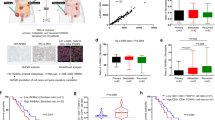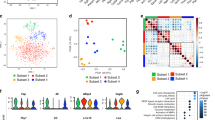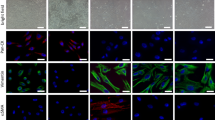Abstract
Fibroblasts can easily be cultured from human solid ovarian tumor biopsies and are readily transfected using retroviral vectors. To test the feasibility of using these cells as a vehicle for regional, intraperitoneal (i.p.) ovarian cancer gene therapy, we first examined the behavior of murine fibroblasts transduced with the neoR marker gene and injected i.p. in syngeneic mice. We found that these fibroblasts were not invasive and formed clusters preferentially attached to the pancreatic and hepatic mesentery, where they survived for at least 30 days and continued to express neoR. We subsequently assessed the effect of regional delivery of murine interleukin-12 (mIL-12)-secreting fibroblasts in a syngeneic immunocompetent mouse model of ovarian cancer (ID8). ID8 ovarian tumor cells were injected i.p. into one flank. Our results show a survival of 88% at 120 days postinjection of animals treated with mIL-12-secreting fibroblasts i.p. in the other flank on the same day as injection of tumor cells. At that time, all animals coinoculated with ID8 cells and unmodified fibroblasts had been or needed to be culled because of advanced neoplastic disease (P < 10−5, log-rank test). Furthermore, animals treated with mIL-12-secreting fibroblasts had a statistically significant decrease in tumor burden, as measured by diaphragm weight, relative to mock-treated groups (P = .0032, H-test). Our histological data show evidence for both immunological and anti-angiogenic mechanisms being implicated in this antitumoral effect. In addition, no signs of IL-12-induced toxicity were observed in any of the tissue sections analyzed. Taken together, our findings suggest that ovarian tumor biopsy-derived fibroblasts are a safe and efficacious vehicle for i.p. delivery of IL-12 as a regional secondary treatment for minimal residual disease of ovarian cancer.
This is a preview of subscription content, access via your institution
Access options
Subscribe to this journal
Receive 12 print issues and online access
$259.00 per year
only $21.58 per issue
Buy this article
- Purchase on Springer Link
- Instant access to full article PDF
Prices may be subject to local taxes which are calculated during checkout
Similar content being viewed by others
Author information
Authors and Affiliations
Corresponding author
Rights and permissions
About this article
Cite this article
Sanches, R., Kuiper, M., Penault-Llorca, F. et al. Antitumoral effect of interleukin-12-secreting fibroblasts in a mouse model of ovarian cancer: Implications for the use of ovarian cancer biopsy-derived fibroblasts as a vehicle for regional gene therapy. Cancer Gene Ther 7, 707–720 (2000). https://doi.org/10.1038/sj.cgt.7700162
Received:
Accepted:
Published:
Issue Date:
DOI: https://doi.org/10.1038/sj.cgt.7700162
Keywords
This article is cited by
-
Phase-I clinical trial of IL-12 plasmid/lipopolymer complexes for the treatment of recurrent ovarian cancer
Gene Therapy (2010)
-
Immune killing activity of lymphocytes on Hela cells expressing interleukin-12 in vitro
Journal of Huazhong University of Science and Technology [Medical Sciences] (2008)
-
Gene therapy of ovarian cancer with IFN-α-producing fibroblasts: comparison of constitutive and inducible vectors
Gene Therapy (2006)



